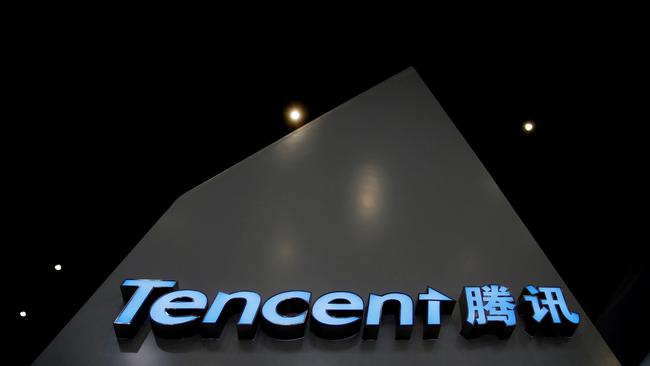Tencent’s dive after Monster video ban reveals truth about China’s controls
This week’s plunge in the share price of Chinese online gaming and chat company, Tencent, is a case study in modern China.

This week’s plunge in the share price of Chinese online gaming and chat company, Tencent, is a case study in modern China.
On the one hand, in China and in Tencent in particular, we have some of the most entrepreneurial companies in the world, driven by a huge market which has a seemingly insatiable appetite for online products, pushing the envelope with new games and China’s largest messaging platform, WeChat.
China is the world’s largest gaming market with an estimated annual revenue of $US38 billion ($52bn).
Tencent is a media and gaming giant that became the first Asian company to have a market capitalisation of more than $US500bn last year.
Its share price has been falling this year due to concerns over a slowdown in its gaming business.
On the other hand, you have the Chinese government — or more specifically the more austere government of President Xi Jinping — which still maintains a strong grip over the regulations that affect Chinese companies, particularly media-related ventures.
The two sides clashed over the government’s move this week to ban Tencent from releasing its new video game — Monster Hunter: World — in the China market.
Tencent’s gaming arm, WeGame, announced that it was pulling the Japanese-made game from its China market, offering to refund purchasers if they applied for a full refund by August 20.
(Unlike some Australian companies, companies in China don’t debate edicts from Beijing’s regulators.)
The result was an inevitable win for the government and a train wreck for Tencent, its investors and the broader tech sector, with Tencent’s value dropping a massive $US46bn this week on the news of how much its business has been impacted by a suspension of approval for new video games.
As one of the poster children for modern China, with more than a billion people using its WeChat platform, one could ask how did Tencent get it so wrong when it came to the important task of dealing with Chinese regulators on its games.
There have been increasing grumbling from regulators that Tencent’s videos are becoming too violent and too addictive for Chinese youth. But this week’s shock announcement from Tencent produced wider public confirmation that regulators have been blocking approvals for new video games since March, a move that has slowed the whole China video gaming market.
It has emerged that China’s State Administration of Radio and Television, which is in charge of monitoring games and other entertainment content, has not issued licences for any new games since March 28. If so, why did Tencent go ahead with the launch of its latest game?
The rumours around China yesterday were that it was concern about the trend of violence in videos which was the main reason authorities blocked the game — a move which one source said was leading to “widespread panic” in the broader gaming industry in China.
But there is also a bureaucratic factor at play. China this year announced a major restructuring of its bureaucracy which was aimed at streamlining regulation.
There are reports that the move to block Tencent’s new game followed some differences of opinion within the bureaucracy following the changes.
When it comes to videos in China, there are two different approval processes — one for the content itself (handled by radio and television body) and another for the company’s method of monetising that content, which is handled by another regulator.
CLSA yesterday explained the regulatory issue facing Tencent in its report on its profits.
“The General Administration of Press and Publication has temporarily suspended approval for games’ monetisation due to restructuring at the senior government level,” it said.
“A lot of new games have not been approved due to the suspension. Tencent had 15 games in the pipeline, which have already been approved for monetisation.
“The GAPP has opened up a new, temporary ‘Green Channel’ for new game approval, granting a maximum of one month monetisation for testing purposes.”
But CLSA says as Tencent’s new game already had a large user base, it could not use this new ‘Green Channel’ and needed to go through the official channel.
“The company does not know when the official channel will be reopened, but remains in close talks with the regulatory bodies.”
If it sounds complicated, it is.
But it is a sign of the times that regulatory changes in Beijing can have repercussions on world markets these days, given the size of some of the big Chinese companies.
There were rumours in China yesterday that Beijing has not been happy at the worldwide coverage the move has got, urging local press to tone down coverage of the situation.
In short, it appears that it has been a bit embarrassed at the attention the move has received and the subsequent impact on markets.
For its part, CLSA has a buy recommendation on Tencent and is confident that the company will find a way through the process.
The Tencent share price plunge is another reminder to the world of the sheer importance of some of the big Chinese companies — and indeed China itself — and the lack of any real knowledge of how decisions are being made in Beijing.
As The Australian’s former Chinese correspondent Rowan Callick observed astutely in a column earlier in the week, when it comes to knowing how decisions are being made in government in China these days, it is a bit of a black box.
Do the tighter controls on new video games represent a stricter stance on video violence from the Xi administration? And on the broader issue of video games in general? Quite possibly.
This week has been both a wild ride on world sharemarkets and another insight into socialism with Chinese characteristics 2018.



